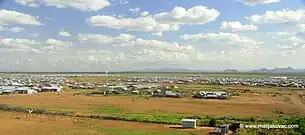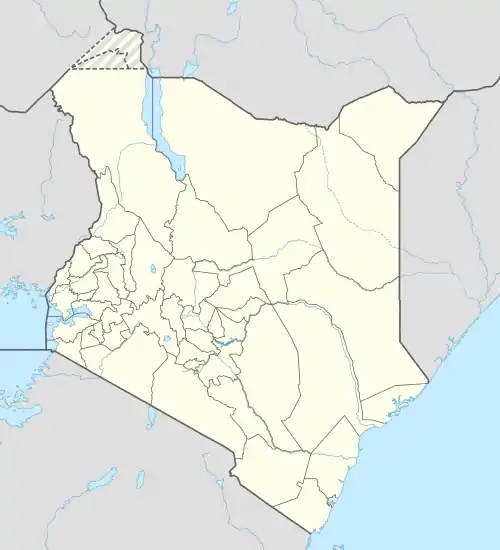Kakuma Refugee Camp | |
|---|---|
camp | |
 Kakuma Refugee Camp | |
 Kakuma Refugee Camp Location in Kenya | |
| Coordinates: 03°43′N 34°52′E / 3.717°N 34.867°E | |
| Country | |
| County | Turkana County |
| Population | |
| • Total | ~200,000 |
Kakuma Refugee Camp is a refugee camp located in northwestern Turkana County, Kenya. It was established in 1992 to host unaccompanied minors who had fled the war in Sudan and from camps in Ethiopia. The camp is situated in the second poorest region in Kenya and as a result of this poverty, there are ongoing tensions between the refugees and the local community that has occasionally resulted in violence.[1][2][3]
History
The camp was established in 1991 to host unaccompanied minors who had fled the war in Sudan and from camps in Ethiopia. It was estimated that there were 12,000 “lost boys and girls” who had fled here via Egypt in 1990/91. In 2014, the population of Kakuma town was 60,000, having grown from around 8,000 in 1990.[4]
Geography
Kakuma Refugee Camp is located in northwestern Turkana County, Kenya. It is situated in the far northwest corner of Kenya, between Lake Turkana, South Sudan, and Uganda.
Demographics
As of December 2020, the site hosts around 200,000 people, mostly refugees from the civil war in South Sudan. Many people in Kakuma are long-term refugees, living in hopelessness and desperation. The situation is particularly bad for young people.[5] Kakuma Camp is divided into four namely: Kakuma 1, 2, 3 and 4 while Kalobeyei Settlement comprises three villages: Village 1, 2 and 3.[1]
Facilities
The complex comprises four parts (Kakuma I-IV) and is managed by the Kenyan government and the Kenyan Department of Refugee Affairs in conjunction with the UNHCR. Staff members are housed outside the camp in three large compounds with various amenities, including a swimming pool, bars, shops, recreational centers, and exercise rooms for weights, yoga, and aerobics.[6]
Issues
_-School_children_in_Kakuma_refugee_camp%252C_Kenya_1.jpg.webp)
Malnutrition, communicable disease outbreaks, and malaria are all ongoing problems, while donor support has faltered due to conflicts in other parts of the world. The only plants that survive are thorny bushes and a few flat-topped trees.[7] As agriculture is almost impossible this results in fierce competition among different local groups for ownership of cattle. Refugees are not allowed to keep animals, due to the potential for conflict between the refugees and the local Turkana people.[8]
Awards
In 2016, Kakuma Refugee Camp became the first recipient of the Ockenden International Prize, an esteemed international prize that recognizes and supports projects that promote the self-reliance of refugees and displaced individuals.[9] The prize, amounting to US$100,000, was awarded to the ‘Women’s Empowerment Project’ by Young African Refugees for Integral Development (YARID) from Kampala, Uganda.[10]
References
- 1 2 "Kakuma Refugee Camp and Kalobeyei Integrated Settlement". UNHCR. 3 April 2020. Archived from the original on 27 November 2023. Retrieved 27 November 2023.
- ↑ "Lost boys and girls | D+C - Development + Cooperation". www.dandc.eu. 16 September 2021. Archived from the original on 11 December 2023. Retrieved 27 November 2023.
- ↑ "Kakuma Refugee Camp". Kakuma Girls. Archived from the original on 12 December 2023. Retrieved 27 November 2023.
- ↑ "Kakuma Refugee Camp". UNICEF USA. Archived from the original on 12 December 2023. Retrieved 27 November 2023.
- ↑ ""We call it a camp, but it's really a city" - OPEC Fund for International Development". opecfund.org. Archived from the original on 27 November 2023. Retrieved 27 November 2023.
- ↑ "ACT Appeal Kenya: Kakuma Refugee Camp - AFKE-11 - Burundi | ReliefWeb". reliefweb.int. 23 March 2001. Archived from the original on 26 December 2023. Retrieved 27 November 2023.
- ↑ "IRC | Food Supplies Dwindle At Kenya Refugee Camp; IRC Raises Concern in Washington". 3 October 2005. Archived from the original on 3 October 2005. Retrieved 27 November 2023.
- ↑ "Frozen lives | D+C - Development + Cooperation". www.dandc.eu. 15 January 2016. Archived from the original on 27 November 2023. Retrieved 27 November 2023.
- ↑ CORRESPONDENT (15 November 2023). "Kakuma-based affordable clean energy firm wins global award for powering refugees". Capital Business. Archived from the original on 27 November 2023. Retrieved 27 November 2023.
- ↑ "The 2021 Prize Winners". Ockenden International. Archived from the original on 27 November 2023. Retrieved 27 November 2023.